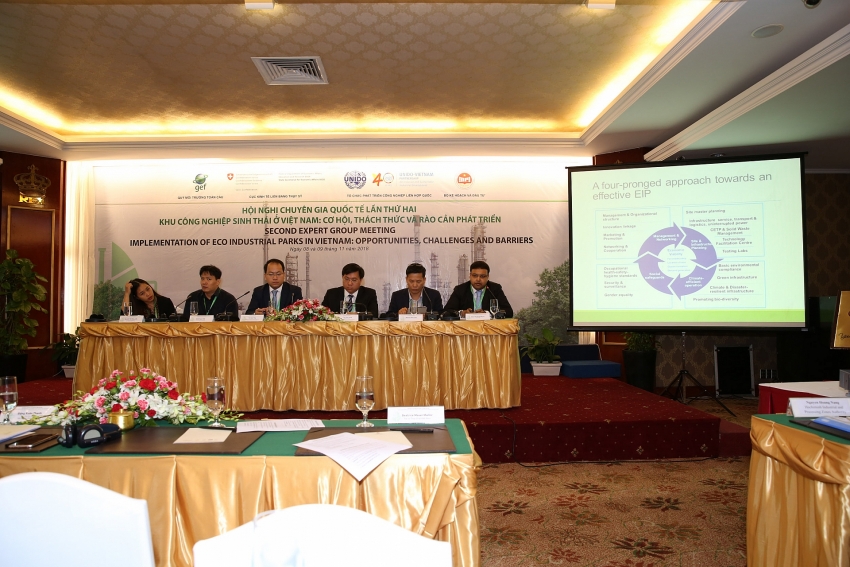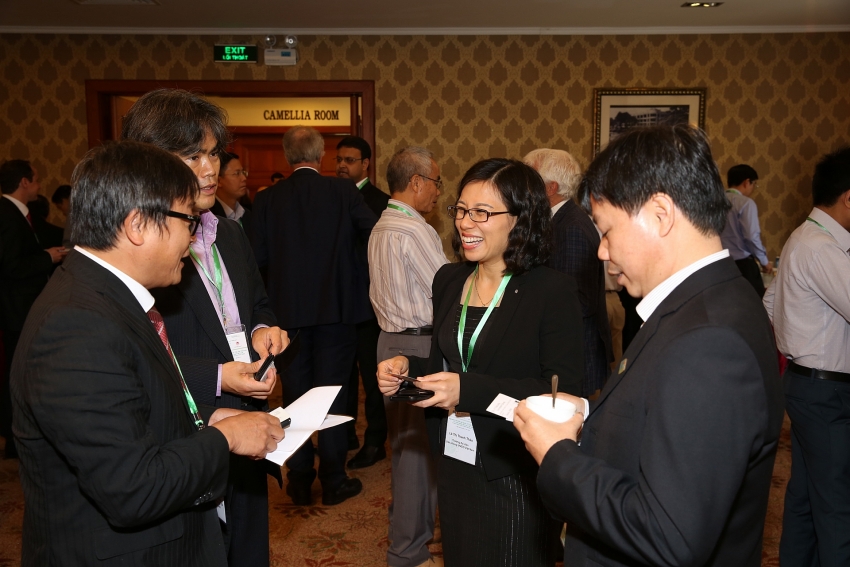Vietnam heads towards Eco-Industrial Parks
The meeting concentrated on exchanging experiences and collecting expert opinion on the development of Eco-Industrial Parks, and improving awareness and information exchange between government management authorities and policy-makers.
 |
| The second expert group meeting gathered in Ho Chi Minh City to discuss Eco-Industrial Parks |
With the theme “Eco-Industrial Park: Opportunity, Challenges and Barriers,” the meeting was held by the Ministry of Planning and Investment in collaboration with UNIDO, the State Secretariat for Economic Affairs, and the Global Environment Fund.
This meeting was part of the project entitled “Implementation of Eco-Industrial Park Initiative for Sustainable Industrial Zones in Vietnam” which is now being executed by the United Nations of Industrial Development Organization (UNIDO) and the Ministry of Planning and Investment (MPI) with support the Global Environment Facility (GEF) and the Swiss State Secretariat of Economic Affairs (SECO).
 |
| The event was a potent opportunity for experts to network and share ideas |
Tran Duy Dong, director of the Ministry of Planning and Investment’s Economic Zones Management Department cum national director of the project, highlighted the positive contributions of industrial zones to the country’s economy.
Via the Eco-Industrial Park project, the MPI and UNIDO have built three pilot eco-industrial parks in three provinces: Ninh Binh, Danang, and Can Tho. The aim of theses eco-industrial parks is to ensure three pillars for sustainable industrial development, including economic development, environment protection, and social development.
According to Dong, after nearly four years of implementation in Vietnam, the Eco-Industrial Park project has been very successful.
“Firstly, the eco-industrial park concept has been identified and made well-known across society, from government authorities and policy makers to enterprises and especially residents. Secondly, Decree No.82/2018ND-CP regulating the management activities in industrial and economic zones, ratifying the regulation on the management of eco-industrial parks in Vietnam have been ratified. Thirdly, via this project, enterprises at the piloting provinces of Ninh Binh, Danang, and Can Tho have improved their awareness of greener manufacturing solutions and energy efficiency solutions. Hundreds of ideas and solutions were applied in these three industrial parks and I am happy to say that 90 per cent of these ideas and solutions were applied well to save dozens of billions of Vietnamese dong annually,” Dong said.
 |
| Eco-Industrial Park projects offer a lot of opportunities, but also face legal constraints |
However, there still remain challenges such as environmental pollution and the ineffective use of natural resources, while living standards have not improved.
The Vietnamese government has been working tirelessly to tackle these issues. One of its outstanding efforts was the issuance of Decree 82 regulating the management activities of industrial and economic zones including the management of eco-industrial parks in Vietnam.
Professor Heinz Leuenberger from University of Applied Sciences and Arts Northwestern Switzerland stressed that Decree 82 gives a legal base for the implementation of Eco-Industrial Parks in Vietnam. The implementation offers a lot of opportunities, but faces also barriers and problems and constraints in Vietnamese legislation.
“In order to implement this, we must have the active involvement of different stakeholders, including the private sector,” Leuenberger said.
Leuenberger added that the project’s overall objective for 2018 was to reach a common understanding of the next steps in the “Implementation of Eco-Industrial Park Initiative for Sustainable Industrial Zone in Vietnam” project, understand gaps in policy and legislation, while identifying, engaging, and motivating relevant stakeholders as well as further raising Vietnamese decisionmakers’ awareness of the opportunities and challenges inherent in Eco-Industrial Parks.
According to the MPI, to implement the government’s plan on developing industrial parks, since 1991, 326 industrial parks and processing zones have been established on a total area of 94,000 hectares, attracting 16,000 projects with a total of $180 billion investment capital.With its first phase nearing completion in 2019, the project has so far produced positive results in improving awareness of Eco-Industrial Parks, as well as pushing enterprises in industrial parks to actively improve technologies and apply greener solutions and more efficient energy.
According to Le Thanh Thao, UNIDO representative in Vietnam, the project has been successfully encouraging enterprises to improve their management and production process towards more efficient and greener methods, reducing pollution and increasing recycling.
Thanks to this project, 72 enterprises have applied technology to reduce more than 24,880 tonnes of CO2, saving more than 429,000 cubic metres of water and 18 million kWh of power annually.
What the stars mean:
★ Poor ★ ★ Promising ★★★ Good ★★★★ Very good ★★★★★ Exceptional
Related Contents
Latest News
More News
- VNPAY and NAPAS deepen cooperation on digital payments (February 11, 2026 | 18:21)
- Vietnam financial markets on the rise amid tailwinds (February 11, 2026 | 11:41)
- New tax incentives to benefit startups and SMEs (February 09, 2026 | 17:27)
- VIFC launches aviation finance hub to tap regional market growth (February 06, 2026 | 13:27)
- Vietnam records solid FDI performance in January (February 05, 2026 | 17:11)
- Manufacturing growth remains solid in early 2026 (February 02, 2026 | 15:28)
- EU and Vietnam elevate relations to a comprehensive strategic partnership (January 29, 2026 | 15:22)
- Vietnam to lead trade growth in ASEAN (January 29, 2026 | 15:08)
- Japanese business outlook in Vietnam turns more optimistic (January 28, 2026 | 09:54)
- Foreign leaders extend congratulations to Party General Secretary To Lam (January 25, 2026 | 10:01)

 Tag:
Tag:























 Mobile Version
Mobile Version